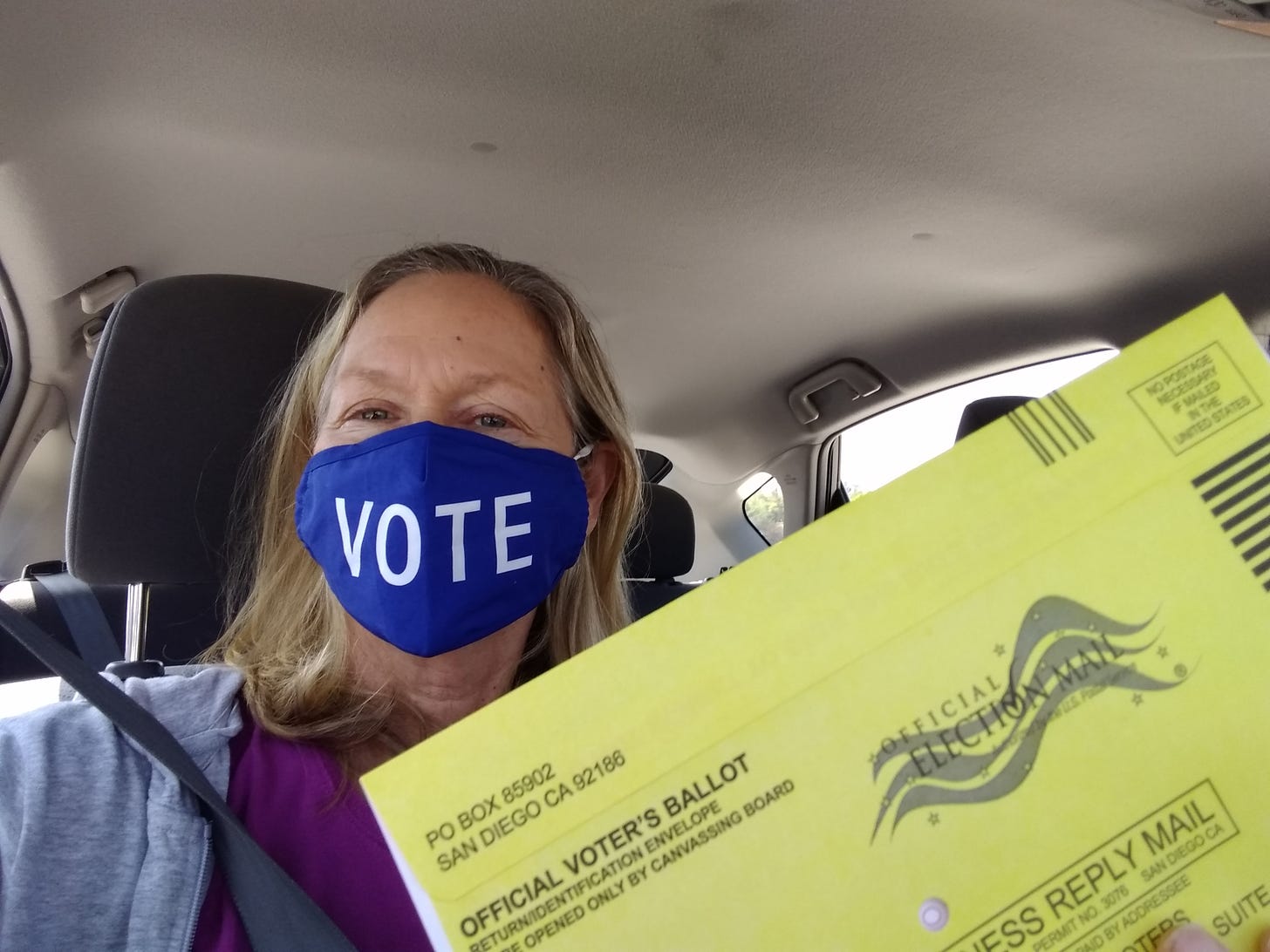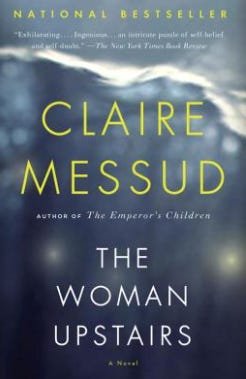“We have a world full of women who are unable to exhale fully because they have for so long been conditioned to fold themselves into shapes to make themselves likeable.”
― Chimamanda Ngozi Adichie, Dear Ijeawele, or a Feminist Manifesto in Fifteen Suggestions
In this issue:
I voted! What about you? Click here for a link to share with someone who needs info about voting

Also in this issue:
Likable women - a mini-rant
Books and more by and about interesting women, some of whom are quite pissed off
Let’s Talk About Likability — Again
A woman I once met and I were talking bucket lists. On hers: punching a man in the jaw and watching him tumble to the ground. I got it. I once startled two of my closest friends by telling them Lorena Bobbitt was one of my heroes. Let’s just say that, at that time in my life, I had my reasons.
Being a woman can be a rage-inducing experience even when she is fortunate, as I have been. By fortunate, I mean I have never been raped as one friend of mine has been and as too many women are every day. I’ve always had a roof over my head and food on the table even though, for seven years, this meant putting up with emotional and sometimes physical abuse from the man I lived with then. By fortunate, I mean I have experienced the garden-variety everyday sexism of the corporate workplace but also encountered opportunities and made friends I would never have otherwise. I grew up during a time when sexual experimentation was the norm and survived male behavior combined with my own self-abasement that would be and should be unacceptable today.
Most importantly, I’ve been lucky in my friends and in my family and in the man who is now my husband. With him, I have experienced not only deep love and respect but true partnership, a kind that I did not witness growing up, see on television, or read about in books. This is a lot to put on his shoulders but he has, in many ways, redeemed men for me by showing me what is possible. I suspect that being with him all these years may have helped me to be more likable which is a good thing because god help the woman in our culture who is not likable, right?
I’ve expended many hours and years of my life trying to be liked - smiling when a jovial male boss said “Come on, smile” when I was telling him the results of my research, not saying anything when I found out that a man with my exact qualifications had been hired at a higher salary than I was, and saying yes to situations that made me uncomfortable and sometimes scared me. I’m not a naturally outgoing person although I’ve learned to act like one. Every now and then, okay lots of times, my prickly self surfaces and I have to do a fair amount of apologizing and backpedaling. Some call it growth. I call it painful and, sometimes, unfair because no man on this earth has ever been told to “smile” when he was doing serious work and no man has been told he is unlikeable because he was bossy, blunt, interrupted, or forgot to say please.
The “likability” discussion is old and boring, yet resurfaces with the stubborn persistence of a herpes infection.
Consider what happened in the wake of this week’s presidential debate: Kamala Harris’s body language, tone, and demeanor were observed and policed in a completely predictable manner which in turn triggered a fresh batch of Op-Eds by smart women such as this one by Amber Phillips. They point out all over again that the vague term “likability” has become a weapon used to subdue the power of a woman who is seeking her full potential on the public stage. Harris was judged not only as a woman but as a woman of color which attracts even more judgement on her behavior. Just ask Michelle Obama or better yet, read her memoir “Becoming.” Both Harris and Obama are intelligent, direct, and beautiful women with a breadth of accomplishment, experience and knowledge that is rare among those who would lead our nation. All this, of course, is diminished if they do one thing that is considered unlikeable or, Heaven forbid, angry.
What bothers me most about it is that it is not just men who are judging women in this way; women themselves are just as biased about other women’s likability. In a study described in this New York Times article, young women were just as likely as young men to find women executives unlikable. I wonder, is it really that we don’t find women leaders likable or is it something about ourselves that has us worried?
The same question arises when we consider fictional women. A few years back when Clair Messud’s novel “The Woman Upstairs” came out, the author was asked this question by Publisher’s Weekly: “I wouldn’t want to be friends with Nora, would you? Her outlook is almost unbearably grim.” Messud replied:
“For heaven’s sake, what kind of question is that? Would you want to be friends with Humbert Humbert? Would you want to be friends with Mickey Sabbath? Saleem Sinai? Hamlet? Krapp? Oedipus? Oscar Wao? Antigone? Raskolnikov? Any of the characters in The Corrections? Any of the characters in Infinite Jest? Any of the characters in anything Pynchon has ever written? Or Martin Amis? Or Orhan Pamuk? Or Alice Munro, for that matter? If you’re reading to find friends, you’re in deep trouble. We read to find life, in all its possibilities.”- Claire Messud
Ruth, the protagonist in my book “Casualties,” forced me to face this whole question of likability. Readers who respond to her tend to fall into one of two groups: those who readily identified with the conflicts she experienced between her career and her son, and those who did not like her and rejected her as a “bad mother.” She was a problem for me too as I wrote the book. For years, yes years, I couldn’t write her properly because I was so busy judging her. I lacked empathy for my own character and as long as I was judging her, I’d never know her. Turned out she got really interesting to me once I dug in and learned the reasons she’d become who she was. I saw how pain had helped to shape her responses. I realized that I instead of discovering her, I’d been seeing her through the screen of my own experiences and harsh self-judgements. I’m guessing we all do that to some degree whether we are confronted with a real person or one that comes alive on the page. The loss is ours. We miss “life, in all its possibilities.”
We are entitled to like or dislike a person but it would be interesting to take a minute and unpack that label likability once and for all, particularly when we apply it to women. What is it that makes a woman unlikable? Is it because she is mean, ugly, boring, unpleasant, rude, or angry? Is it because she’s different? Is it because she reminds us of something we’d rather forget? Or is it just something that you know when you see it? Do you have to like a person to respect or even support the policies of that person? Is it possible to empathize with someone you don’t like or to be curious about her? Are our different expectations of women and men clouding our assessment?
There are lots of questions here. I’d be really interested in how you see all this. Tell me what likable means to you or if you require it in a character you are reading about. In fact, tell me how you feel about the character(s) in the book you just finished. Or anything, just send me your thoughts, take a picture right now of the books by your bedside or tell me what you’ve finished reading and what book you are reaching for next. I love to hear from you. You can use the comment section or email me. If you would like to leave a comment and have not yet done so, just click the “subscribe” button here and register so the site knows you are real and not spammers.
Below I offer a small group of real and fictional women I like a lot. And some of them are pretty angry.
Real Women I Find Very Likable
Jean Guerrero: In her Op-Ed Piece for the San Diego Union Tribune, Guerrero fearlessly takes on the critics who say she is not qualified to do her job. She doesn’t care if they like what she has to say or not.
In her fiction and nonfiction Kristen Tsetsi explores big and controversial ideas about choosing to be child-free in our culture. She has co-founded with Isabel Firecracker and LeNora Faye the “ChildFree Girls” podcast and webseries.
Alexandria Ocasio-Cortez: this moment brilliantly demonstrated how a woman can channel conviction and anger into a thing of inspiration and beauty.
Fictional Women
“The Woman Upstairs” by Claire Messud

When I read this novel, I saw myself as I might have been. Nora is a middle-aged single women, responsible and good, independent, invisible to many, a bit bitter, very intelligent, and still pulsing with need for connection and to make art even though she gave it up for a more practical life earlier on. Her needs allow her to be used and made it easy for her to be betrayed by the people whose regard mattered to her. And she was angry about all of it. Yet as I read, I saw many points of connection: her sense of isolation, her need to make something that would matter, her need for self-esteem. It wasn’t always comfortable but the writing was so compelling and the story so well-told that Nora has stayed with me.
If you are looking for novels with interesting rather than strictly likable women, you will find a few in this Atlantic article from 2015.
Calling for Your Contribution to “Moment of Zen”
Here’s your chance to share your “moment of Zen” that ends every issue of Spark. It’s going down as one of the most fun things ever. This week’s contribution comes from the backyard of Mary Jean from Southern CA.
What is YOUR moment of Zen? Let’s open this thing up. Send me your photos, a video, a drawing, a song, a poem, or anything with a visual that moved you, thrilled you, calmed you. Or just cracked you up. This feature is wide open for your own personal interpretation.
Come on, go through your photos, your memories or just keep your eyes and ears to the ground and then share. Send your photos/links, etc. to me by replying to this email or simply by sending to: elizabethmarro@substack.com. The main guidelines are probably already obvious: don’t hurt anyone -- don’t send anything that violates the privacy of someone you love or even someone you hate, don’t send anything divisive, or aimed at disparaging others. Our Zen moments are to help us connect, to bond, to learn, to wonder, to share -- to escape the world for a little bit and return refreshed.
I can’t wait to see what you send!
That’s it for this week. All books mentioned in this issue are available from the Spark Community Recommendations page on Bookshop.org where every sale helps local bookstores and will, eventually, help us to raise money for literacy programs. In fact, if you have friends who have not heard of or are thinking about buying a book, send them over to our page to browse. And let me know what you are reading so we can expand our list! To comment, you may have to register first so to do that, just hit the subscribe button below and follow instructions and you’re good to go.
Gratefully yours,
Betsy (Don’t forget to vote!)
P.S. And now, your moment of Zen…let us pray. Here’s a male praying mantis sunning himself on a rock. Take a good look. When he finds his mate, she will take all he has to offer and then eat him alive. She won’t ask if he finds her likable.





my moment of zen this week: In spite of all the fear and chaos of a return to school, my pre-kinder and I were outside drawing with chalk on the sidewalk on a sunny afternoon. we looked up and saw a huge, beautiful hawk sitting atop a carved art pole in our garden, engraved with many languages, all saying 'peace.' we watched as he sat atop their proudly, then spread his wings to fly to the tree, then finally, back into the sky. we were all mesmerized and in awe.